
Features
 Threshing and separation concept of T-Series Combine
Threshing and separation concept of T-Series Combine
Functional components:
- Large, 660-mm (26-in.) diameter threshing cylinder with 10 rasp bars and increased concave area
- Smooth stripper roll and enlarged overshot beater
- Enlarged, 800-mm (31.5-in.) separator with high-performance separation grate
- Eight-wing, 400-mm (15.7-in.) rear beater and rear beater grate
- Seven-step straw walker design with welded or optional bolted universal and corn-cob mix (CCM) grids
- Sectional concave with quick adjustable de-awning plates
Large, 660-mm (26-in.) threshing cylinder with 10 rasp bars and enlarged concave
The unique multi-drum threshing system ensures a consistent crop flow by moving crop above the rear beater without sharp bends or abrupt changes in direction. This guarantees excellent grain and straw quality and reduces power requirements.
The large, 10-rasp bar threshing cylinder with 660-mm (26-in.) diameter provides excellent grain quality and gentle material handling.
Combined with the enlarged wrapping angle of 124 degrees, this ensures excellent threshing efficiency and unmatched capacity even in tough separating conditions.
- Four rasp bars are in constant contact with the crop against the concave area for excellent threshing and separating
- Provides a large concave area and allows a slow cylinder speed
- Ensures gentle threshing and separation to reduce grain damage
- Large, concave wrapping angle ensures high grain separation right at the beginning and reduces separation load on the straw walkers
- Wide, 1670-mm (65.7-in.) (six-walker) channel width grants maximum throughput even in tough separating conditions
Stripper drum and overshot beater
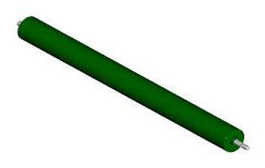 Stripper drum
Stripper drum
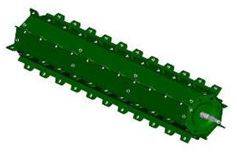 Overshot beater
Overshot beater
The T-Series Combine threshing system uses a smooth surface stripper roller behind the threshing cylinder to gently direct the material to the overshot beater. This prevents material from back feeding on the threshing cylinder, eliminating blockages of the cylinder. The stripper roller speed runs at 125 percent ratio of the threshing cylinder speed.
The 500-mm (19.7-in.) overshot beater on the T-Series Combine continues the material flow process. Material travels over the top of the beater and is directed into the separation drum.
Smooth crop flow is achieved without harsh angles or abrupt changes in direction.
The eight-wing beater has a constant speed. The serrated design of the wings’ leading edges engages the mat of material and moves the high volumes of tough, damp straw without buildup or bunching.
Sectional concave with quick adjustable de-awning plates
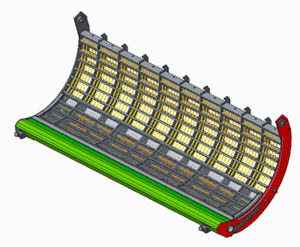 Sectional concave with small-grain inserts
Sectional concave with small-grain inserts
Feature benefits:
- High versatility and flexibility with three different concave inserts available
- Uptime ensured with fast exchange design
- Easy access from stone trap and storage position for the concave inserts
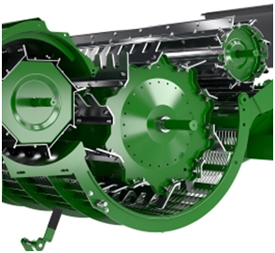 Extra-large separator and dynamic tangential grate
Extra-large separator and dynamic tangential grate
The 800-mm (31.5-in.) extra-large separator drum provides additional separation capacity on the T-Series Combine. Due to the open design, the drum is not heavier in weight than the previous closed design.
The extra-large separator drum runs at two factory-installed speeds:
- 760 rpm for small grain and grass seed
- 380 rpm for canola, peas, and beans
There is an optional 270-rpm speed reduction kit available for corn harvest which is included in the corn package. Swapping the belt speed can be done easily and quickly by changing the drive pulley via a lever-operated tension pulley.
The extra-large separator drum runs at a lower speed compared to the previous T670 design that was operated at 900/450 rpm. While it seems that higher drum speeds result in more efficient separation capacity caused by the higher centrifugal force, the opposite effect has been measured. While the centrifugal force has a vital impact on the separation capacity, speeds of the separator drum that are too high result in low exposure time in the high-performance separator grate. This is shown in the following graph.
Comparison of separator speed
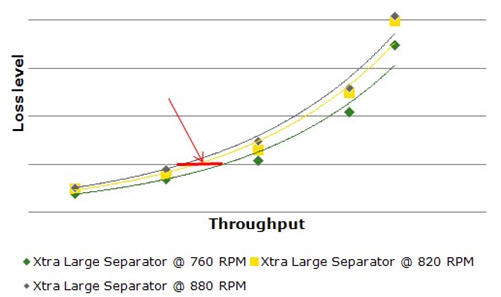 Comparison of separator speed
Comparison of separator speed

The red line indicates the performance delta at a loss level of one percent between the different separator speeds.
The dynamic tangential grate (new beginning in model year 2019) features a completely updated design equipped with a full wire profile as described below.
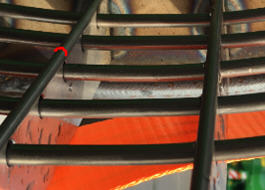 Dynamic tangential grate
Dynamic tangential grate
For model year 2019 and newer, the design was changed for fewer restrictions on crop flow and optimal separation that would not affect straw quality.
- All the transversal bars are produced with round edges for better crop flow and straw quality.
- All the wires are repositioned as close to the upper edge as possible to prevent any straw accumulation, therefore improving separation capacity.
- The wires are implemented on the complete area and replace finger rakes for larger opening areas (+10 percent opening area versus model year 2016 tangential grate).
Rear beater and rear beater grate
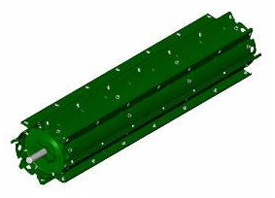 Rear beater
Rear beater
The 400-mm (15.7-in.) rear beater on the T-Series Combine continues the material flow process. The beater delivers material to the straw walkers. The beater is driven directly from the extra-large separator drum and is operated at two speeds.
- 900 rpm for small grain and grass seed
- 450 rpm for rape seed, corn, peas, and beans
A separation grate is mounted underneath the rear beater. The grate is adjustable with a handle on the right side.
The rear separation grate features 14 percent more open area in the separator grid and a fully rounded profile on the wires and cross bars. This creates a better separation effect thanks to a faster, unobstructed crop flow over the grid with a thinner layer of material to boost the separation of kernels trapped in straw.
Two positions are available:
- Wide position recommended in rape seed, corn, peas, beans, or other sensitive crops
- Narrow position for small grain or grass seed
Inside the T-Series threshing and separation system is an eight-winged, rear beater drum that separates the remaining grain out of the straw mat. The rear beater grate provides additional active separation area.
Straw walker concept
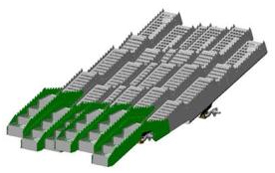 Seven-step straw walker design
Seven-step straw walker design
The T-Series Combine has a seven-step straw walker concept. Compared to the previous T-Series, the model year 2017 and newer straw walker is extended by 80 mm (3.15 in.), which results in a slightly increased overall straw walker area (+ 0.1 m² [1.08 sq ft]). The concept of low walker rpm and high walker stroke provides efficient tossing to fluff even largest straw mats and open channels for the free grains to drop through. This results in most efficient grain separation capability. The straw walker is available with welded or bolted universal and CCM grids for best-in-class reconfiguration and ability to retrofit for all crops and conditions.
The straw walker is equipped with a closed walker trough at the rear, which ensures the grain is captured in the trough and feeds evenly on the walker return pan that is mounted below the front section of the walkers. Section dividers on the return pan help to maintain an even distribution of material onto the front chaffer of the cleaning system, even on slopes.
- High throw provides efficient tossing to fluff even the largest straw mats and open channels for the kernels to drop through.
- Maximum grain separation is achieved at the front section due to the impact of the straw mat when hitting the first walker steps.
- Four shallow, angled steps provide maximum separating efficiency.
Different walker grids are available to match all crop and conditions.
Overall threshing and separation system benefits:
- Greater level of productivity due to the enlarged concave wrapping angle, extra-large separator drum, and the high-performance separator grate
- Best-in-class grain and straw quality can be achieved with the threshing and separating concept
- Fast and easy adoption for different crops
- Lower power consumption and excellent straw quality, making this combine the optimal choice for straw producers
Theory of operation
Versatility on a combine is increasingly important as producers must handle multiple crops, sometimes changing between crops during the day.
The threshing needs are very different from crop to crop. Coarse grains like corn or peas require a round bar profile that is less aggressive to ensure optimal grain quality. Small grains including grass seed, vegetables seeds, and durum wheat need intensive threshing and require a small-grain concave profile which provides aggressive threshing to separate the grain.
The sectional concave is made with a fixed concave associated to a removable design on the front where the threshing begins.
Producers can install three different concave profiles:
- Small-grain concave inserts
- Universal concave inserts
- Round-bar concave inserts
- Sectional concave with round-bar concave inserts
Producers can exchange the concave inserts in 15 to 20 minutes by opening the stone trap.
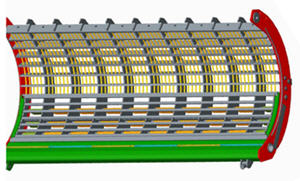 Concave inserts can be exchanged on the combine
Concave inserts can be exchanged on the combine
A screw is available on the left side and maintains the concave inserts in the working position. When the operator loosens the screw, he can easily remove the two inserts and replace them with another set of inserts.
On the right side, the operator has the capability via a screw to install or remove the swing in/out booster bar.
The machine is delivered with small-grain inserts installed and can receive additional universal inserts as factory installed (in storage) or round-bar inserts as dealer installed.
The T-Series Combine is designed for high capacity. The T670 has a total sieve and chaffer area of 6.3 m² (67.8 sq ft) according to ISO Norm 6689: 1997, which is the largest cleaning shoe following the John Deere X9 Combines.
- The Flat Tooth Comb (FTC) chaffer prevent short straw from falling through the grid as they are equipped with special noses.
- The returns are guided back to the cylinder and distributed evenly over the entire width of the threshing cylinder by an auger. The amount of material is recorded and then displayed in the cab via the electronic sensors. To visually inspect the content of the tailings returns, there is an inspection flap just outside the cab door.
- The completely redesigned fan delivers up to 740 m³ (26,133 cu ft) of air per minute and evenly distributes air over the entire width. The large air volume paired with the air flow and the large sieve area makes additional slope compensating features obsolete.
- One non-ventilated step plus two ventilated steps cascades the crop down by 41 cm (16.1 in.) to ensure effective pre-cleaning of chaff. Through intensive testing, John Deere has found the right balance between air pressure and air volume. The air pressure is used to separate the grain and the air volume allows for material to be carried away. This provides the perfect pre-separation effect and evenly divides the material between the front and rear part of the chaffer.
- The heavy-duty conveyor augers ensure active crop flow on slopes and under tough harvest conditions, meaning the cleaning shoe can be optimally loaded even in damp or sticky conditions.
- The total sieve and chaffer, with its considerably enlarged surface up to 6.3 m² (67.8 sq ft), offers high cleaning performance even under tough threshing conditions.
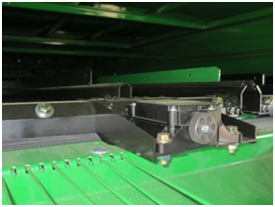 Remote adjustment of Dyna-Flo™ Plus cleaning system
Remote adjustment of Dyna-Flo™ Plus cleaning system
The Dyna-Flo Plus cleaning system comes standard with electric adjustment on all T670 Combines.
The remote cleaning shoe adjustment can be either completed from inside the cab on display settings or with the armrest buttons. As an alternative solution, such as when inspecting the shoe from the outside, settings can also be adjusted from the left side at the rear of the machine.
The remote cleaning shoe adjustment motors are equipped with an integrated position sensor. This eliminates the need for recalibration of the electric motors. Calibrations only need to be redone in case the electric hardware or the cleaning shoe elements get replaced.
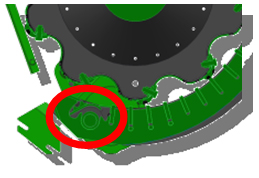 Quick-engage booster bar
Quick-engage booster bar
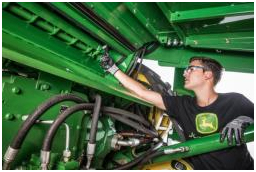 Quick-engage booster bar adjustment
Quick-engage booster bar adjustment
The quick-engage booster bar is adjustable from the outside via the stone trap with a 24-mm (0.95-in.) wrench. It has two positions. In the engaged position, the concave entrance features a profiled rasp bar. In the disengaged position, the concave entrance features a smooth transition plate. Adjustment can be completed easily within minutes.
Material flow coming from the feeder house passing the booster bar is slowed down; this increases the threshing efficiency. The booster bar does not have a negative influence on the crop flow or the grain quality. The booster bar increases threshing efficiency in hard-to-thresh crops without closing the de-awning plates, allowing maximum separation at the concave area.
NOTE: The booster bar is standard on the T670 Combine.
125-L/s (3.55- bu/sec) peak unloading system on the T670 Combine
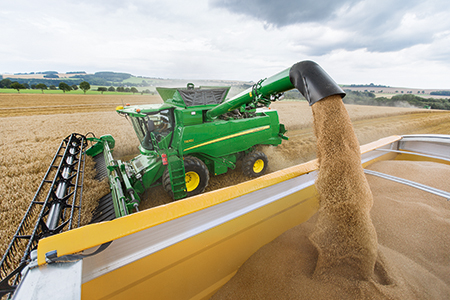 Extra-fast unloading system
Extra-fast unloading system
The extra-fast unloading system provides a peak rate of 125 L/s (3.55 bu/sec) according to ISO 5687:1999 Norm. Compared to the John Deere S770 Combine’s unload rate of 116.3 L/s (3.3 bu/sec), the T670 has a faster unload rate that is also reflected in time saved when unloading on the headland. The extra-fast unloading system comes as the base option on the T670 Combine. Fast unloading on the go allows the operator to concentrate more on the crop by reducing unloading time.
The higher unload rate is achieved by the grain tank cross augers, an increased discharge housing including vertical auger, larger sprockets and chain, and an overall higher speed of the unloading system.
On the headland, the operator can reduce the rate by putting the machine at mid-idle or low idle; this allows for more precision, especially when the trailer is nearly full.
Machine Sync
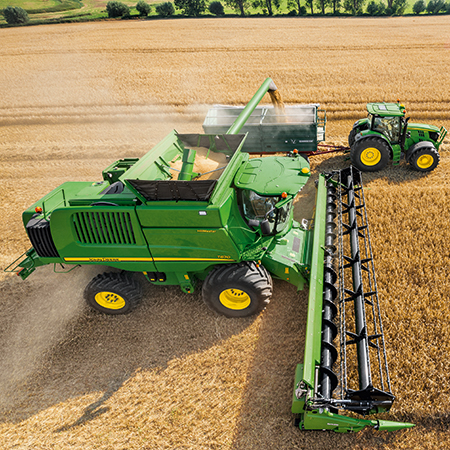 Unload the combine fullest combines first with Machine Sync
Unload the combine fullest combines first with Machine Sync
With John Deere Machine Sync, the combine operator can have the tractor and grain cart drive alongside the combine while unloading. Once in position, the combine operator can control the ground speed and steering of the tractor-cart combination. Additionally, the grain cart operator can see the grain tank levels of several combines and can be called to empty the fullest tank. This saves time, diesel, nerves, and minimizes soil compaction.
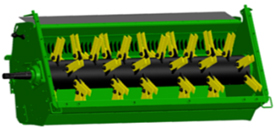 Extra fine cut chopper rotor and housing
Extra fine cut chopper rotor and housing
The improved extra fine cut straw chopper delivers excellent chopping quality and best-in-class residue distribution of chopped material in the field with a cutting width up to 10.7 m (35 ft) and 108 knives.
The extra fine cut chopper comes standard with serrated chopper knives, which ensure superior splicing of the straw and improved straw rotting process. This chopper is highly recommended for producers with no tillage or minimum tillage operations.
The optional dual-speed chopper drive provides flexibility to match all crops and conditions.
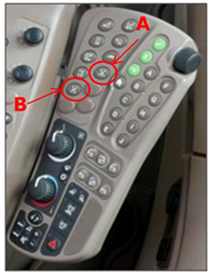 Armrest adjustment
Armrest adjustment
The extra fine cut chopper comes standard with a remote adjustable tailboard.
The remote adjustable vane tailboard can be adjusted from the cab conveniently via armrest control buttons (button A). The in-cab adjustment includes a unique tailboard position swap button (button B); by pressing the button on the armrest, the tailboard vanes automatically swap from left to right stored position and vice versa.
False floor geometry housing
The extra fine cut chopper housing follows the contour of the rotating knifes. This false floor geometry narrows the gap between the rotating knife and the chopper housing to a 4- to 5-mm (0.16- to 0.2-in.) closing at a wrapping angle of 83 degrees. It requires no adjustments and does not require any maintenance or replacements.
Wind paddle
The T670 with extra fine cut chopper comes standard equipped with wind paddles, which are factory installed on two knife rows. The wind paddles are mounted with bushings to withstand impacts from foreign objects. Equipped with wind paddles, the extra fine cut chopper can spread the chopped straw evenly up to 10.7 m (35 ft). Wind paddles are more effective than active radial spreaders, which are normally hydraulically driven.
Counter knives
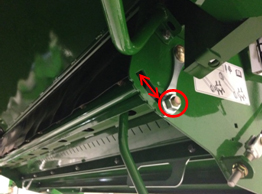 Counter knives adjustment
Counter knives adjustment
The extra fine cut chopper comes standard with a counter knife row, which is infinitely adjustable with two large leavers on each side. To secure the position, only one bolt needs to be tightened at each side.
Grouser bar
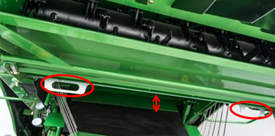 Grouser bar adjustment
Grouser bar adjustment
The extra fine cut chopper features a redesigned grouser bar, which is infinitely adjustable with a slide bar. To reduce the length of chopped material in green straw conditions, the grouser bar should be engaged. In dry straw conditions, it improves the splicing of the straw. To decrease fuel consumption, it is recommended to remove the grouser bar when chopping other crops such as corn, rape seed, beans, peas, and sunflower.
Tailboard angle adjustment
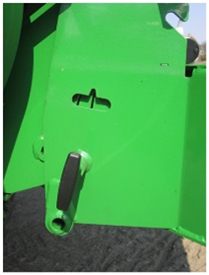 Tailboard angle adjustment
Tailboard angle adjustment
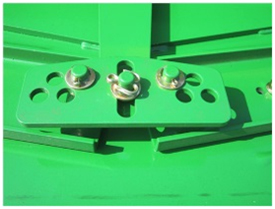 Tailboard vane adjustment
Tailboard vane adjustment
The tailboard angle can be adjusted without tools in three positions with a lever on each side.
In addition to the three-point tailboard adjustment, the vane angle can be set in four additional positions to ensure the spreading width of the residue matches all cutting platforms up to 10.7 m (35 ft).
The extra fine cut chopper comes standard with a 10-vane electrical tailboard design.
Windrow sheet
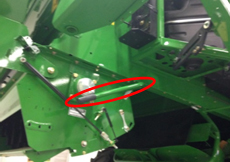 Windrow deflector plate
Windrow deflector plate
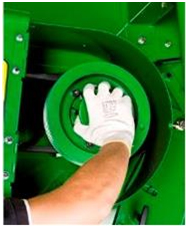 Straw chopper clutch
Straw chopper clutch
A single lever operates the windrow deflector plate. Operated on the right side, the straw is guided into the chopper or down on the ground for windrowing.
The straw chopper is directly driven from the main engine gearcase and automatically engages with the separator drive. A heavy-duty power belt reliably transmits drive power to the chopper. A reliable clutch is used for engaging and disengaging the chopper rotor.
The connected combine
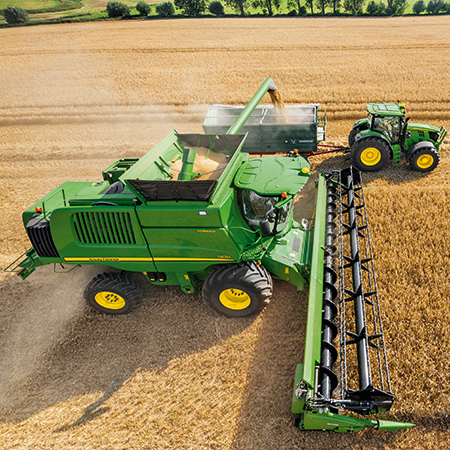 Boost your productivity with connectivity
Boost your productivity with connectivity
John Deere is committed to setting new standards in connected agriculture because this offers tremendous potential to boost productivity, save valuable time, and lower costs.
John Deere has identified the best technologies currently available on the combine market and brought them together into attractive packages:
- AutoTrac™ automatic steering
- Lifetime subscription to JDLink™ system
- Wireless Data Transfer (WDT) to John Deere Operations Center™ application
- Interactive Combine Adjustment (ICA)
- FarmSight™ service packages
Connected customer support
 Maximize uptime with machine-to-office communication
Maximize uptime with machine-to-office communication
Using the machine-to-office connectivity that your John Deere dealer can provide (with your permission) helps maximize machine uptime. For example, the dealer can remotely check machine health and identify potential issues before they stop you from working. With Remote Display Access (RDA), you or your dealer have a live connection from the office to the GreenStar™ 3 2630 Display on the combine to assist the operator with machine setup and operation without needing to drive out to the field.
Operations Center
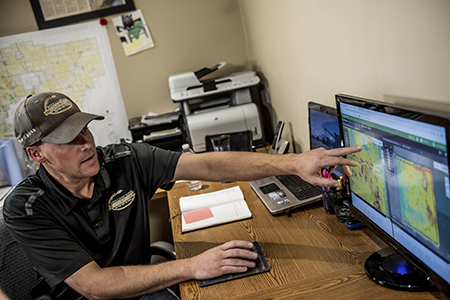 The hub to all your data – MyJohnDeere.com
The hub to all your data – MyJohnDeere.com
The Operations Center on MyJohnDeere.com is the hub for all your data. Store field locations, track the progress of your machines, assign work orders to your operators, view yield and moisture maps, and create, analyze, and share harvest reports with trusted advisors and customers. You can access this feature from any internet enabled device.
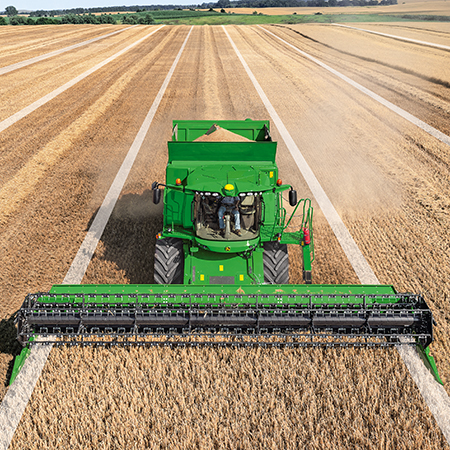 Achieve more with less effort
Achieve more with less effort
With the John Deere satellite-based, hands-free AutoTrac™ steering system, every machine pass utilizes the full cutting width of your platform. This helps you save time and fuel and boost your combine performance – even at night, in dusty conditions, on hillside terrain, or after long hours of operation. The automatic steering relieves your operators and allows them to concentrate on productivity. When working with multiple machines in a field, the AutoTrac guidance lines can be shared from one machine to another so that all combines can harvest at the full cutting width. They can also be shared with the tractor or grain cart operator so the machines can drive exactly parallel to each other during unloading.
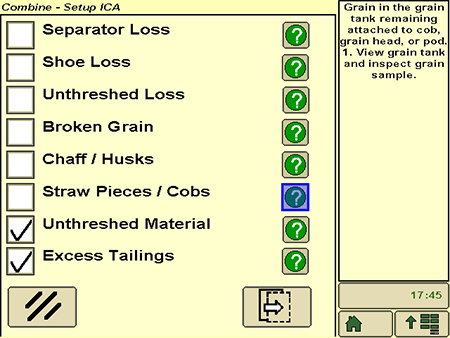 ICA increases the performance of a combine
ICA increases the performance of a combine
With Interactive Combine Adjustment (ICA), you can increase the performance of your combine, minimize losses, avoid grain damage, and improve the quality of your straw. You can either optimize all parameters at the same time or focus on one.
Automatic Combine Adjust (ACA)
Standard on all models within the T Series, Automatic Combine Adjust helps you effortlessly transition between crop types. By using standard John Deere values and retrieving data on your current threshing and separating conditions, it automatically adapts your machine to optimize performance. You can then use these proposed values or modify and save them for later use.
HarvestSmart™ system – Always the right speed
The HarvestSmart system automatically adapts the speed of the combine to maximize capacity or minimize losses with the highest output. Sensors on the threshing cylinder, engine, and dedicated loss sensors control the system with the goal of minimizing losses or maximizing the throughput rate.
Specs & Compare
Key Specs | T670 Current Model |
| Engine type | John Deere PowerTech™ PSS engine 9.0 L 548 cu in. |
| Rated power | 292 kW 392 hp |
| Fuel capacity | 800 L 211 gal. |
| Rotor length | |
| Rotor diameter | |
| Concave area | 1.35 m2 14.5 sq ft |
| Separating area | 4 m2 43.1 sq ft |
| Total cleaning area (louvered) | 6.27 m2 67.5 sq ft |
| Grain tank size | 11,000 L 300 bu |
| Unloading rate | 115 L/s 3.3 bu/sec |
| Channel width | |
| Threshing cylinder diameter | |
Engine | |
| Engine type | John Deere PowerTech PSS engine 9.0 L 548 cu in. |
| Emission level | Final Tier 4 (FT4) |
| Rated speed | 2200 rpm |
| Rated power | 292 kW 392 hp |
| Maximum power | |
| Power boost @ rated speed | 25 kW 34 hp |
| Fuel capacity | 800 L 211 gal. |
| Engine family | |
Feeding | |
| Drive type | Fixed |
| Conveyor chain slat type | Under shot slat |
| Width | |
| Length | 185 cm 73 in. |
| Feed Accelerator, Stone Trap (FAST) | Reverser Standard: 59 kW 79 hp Standard |
Threshing/ Separating | |
| Separator type | Multi Drum/Straw Walker |
| Rotor length | |
| Rotor diameter | |
| Rotor speed range | 220 - 990 rpm |
| Concave area | 1.35 m2 14.5 sq ft |
| Separating area | 4 m2 43.1 sq ft |
| Discharge grate area | |
| Separator drum diameter | |
| Separator drum speed | |
| Threshing cylinder speed range | |
Cleaning | |
| Front chaffer | 0.6 m2 6.46 sq ft |
| Front chaffer extension | |
| Pre cleaning | |
| Chaffer | 3.06 m2 32.9 sq ft |
| Sieve area | 2.64 m2 28.4 sq ft |
| Total cleaning area (louvered) | 6.27 m2 67.5 sq ft |
| Cleaning fan speed | Regular speed: 550 - 1350 rpm Slow speed: 300 - 600 rpm |
Grain handling | |
| Grain tank size | 11,000 L 300 bu |
| Unloading auger length | 7.05 or 8.7 m 23.5 or 28.5 ft |
| Unloading rate | 115 L/s 3.3 bu/sec |
Base weight - less head | |
| Total machine | |
Manufacturing location | |
| Country | Germany |
Additional information | |
| Date collected | 04-May-2018 |